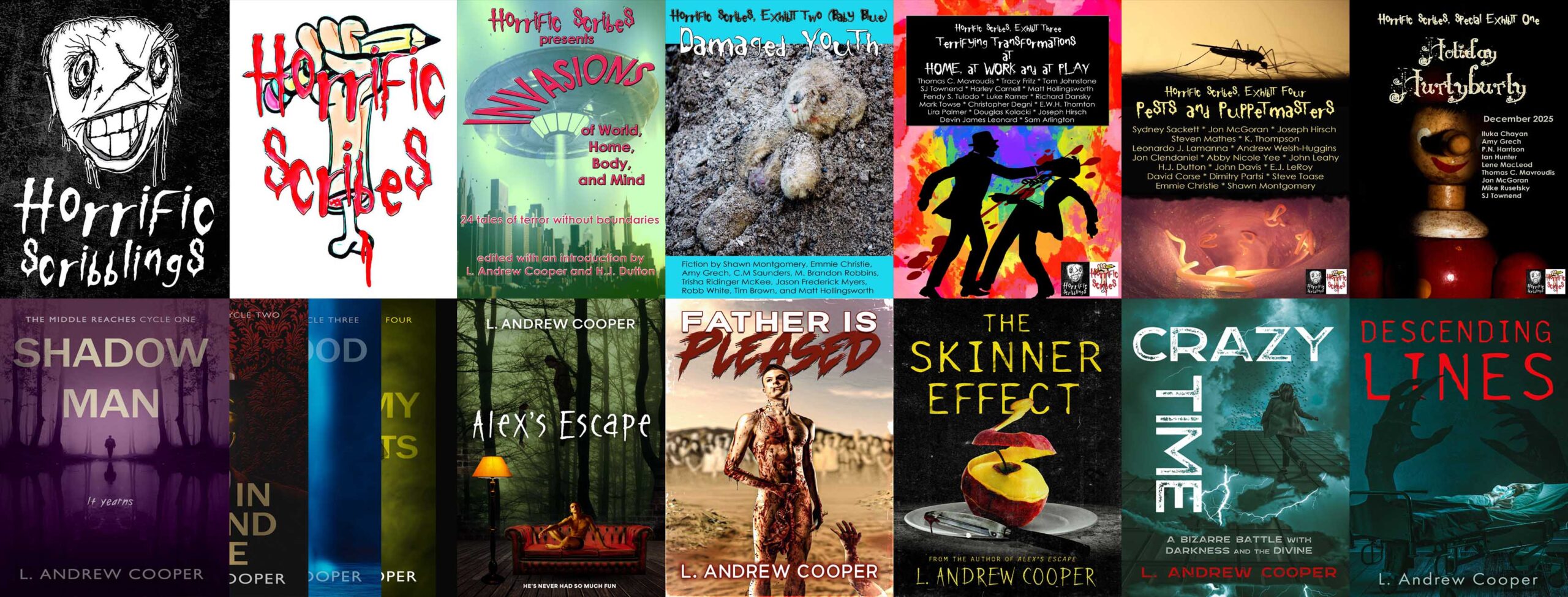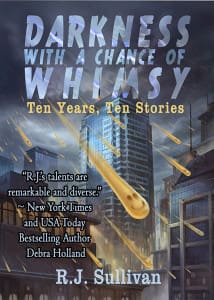Darkness with a Chance of Whimsy showcases author R.J. Sullivan’s development over ten years with ten short stories, providing a brief introduction for each tale that explains its history. It also highlights the diversity of his talent, which spans genres and modes including horror, mystery, suspense, science fiction, fantasy, and even that thing the writers’ guides call “literary.”
As always, although I seldom waste my time writing awful ones, I don’t get prizes of any sort for good reviews (you’re reading the review; there’s also an interview). This time, I’ll lead with the only potential negative I have to warn this site’s anticipated audience about: as horror goes, the collection is on the reserved side, with a few R-rated words but an apparent preference, particularly in the earliest tales, to leave gaps in the description for readers’ imaginations to fill. Naturally, this leave-it-to-the-imagination approach to scares finds favor with at least as many readers as it doesn’t, so it’s also a potential positive. Sorry, I’m tapped. I really liked the book.
I will therefore describe its qualities as one does an object of brilliance one assumes automatically to be good—a diamond—and make the question not “Is it good?” but “How good is it?” To help you reach a conclusion, I will describe four C’s I associate with Mr. Sullivan’s work.
Character
The first tale, “The Assurance Salesman,” comes to us from Sullivan’s college days, but although his intro refers to “youthful exuberance,” the writing is not jejune. As his narrator takes care moving among characters, descriptions embed their psychological dispositions in a fraught context of taken-for-granted ease disrupted by a stranger with calculated temptations (a bunch of people on a train are getting along fine until a guy comes in who offers them dangerous info too juicy to pass up). To help us understand the impact of Gary’s travel away from his wife, for instance, we learn how he sleeps:
“Knowing she is once more beside him, he will dream, something he has not done in thirty days.” (loc. 100, Kindle version)
Concise statements such as these provide a fullness of time for characters we only know briefly due to the short-story format, a fullness that makes the effect of the darkness—the salesman of the title tests the power of faith with the temptation of reassurance, with mixed results—far more poignant. The characters’ failures and victories become internal as well as external, allowing them to carry readers on multiple forms of rides.
Similarly, the second story, “Fade,” centers on characters who have access to power that endangers them, this time power more based in science fiction than the paranormal. Although the story differs significantly, going further to the dark side, it still derives its emotional energy from characters’ places in life and relationships with one another. In the latter half of the book, this character focus appears even more fully realized as Sullivan shares tales of a character he has also taken into longer tales, Rebecca Burton. In “Inner Strength,” we see “Becky” as a child and get to know her father, and in “Backstage Pass,” we see people in her organization’s orbit caught in another trap related to technological temptation. While I could describe “Inner Strength” as “about” parents struggling with a paranormal heritage, or “Backstage Pass” about time travel, I could just as easily say the former is about the struggle of a family to stay together in a world that makes understanding the roles of parent and child more and more difficult, and the latter is about the skull-splitting frustration of trying to fight historical injustice (more on that in a moment). All of the above is true because Sullivan provides depth of character.
For the avid horror fans, I would be remiss not to mention Jinan, the title character of “Robot Vampire,” who Sullivan says is his favorite. Jinan, who may be developing true AI, is, among other things, a lovely dancer. We the readers occupy Jinan’s thoughts some of the time, along with a “friend:”
“Lined with several needle-sharp teeth, the snout punctures Toshio’s throat, and my friend drinks in ravenous hunger. As it feeds, I share its pleasure.” (loc. 2519)
Those last seven words convey the turn of AI to sadism quite beautifully.
Craft
Like a well-rendered character, well-wrought prose goes a long way. Not only does Sullivan command style well enough to put introductory clauses next to the nouns they modify (see the previous quotation for an example!), but he bases one of the collection’s two flash fiction pieces (extra-short short stories) on grammar and style: “Grammetiquette 2030.” I suppose some people might be turned off by a futuristic bit of humor based on grammar and etiquette, but I can’t imagine readers who read much not appreciating the joke. Since he earns the appreciation by not needing the sort of technology featured in this flash piece (he discusses the value of “standard” English in the interview), I find the humor welcome.
Still more welcome is the well-wrought wit that makes both “Grammetiquette” as well as “I Remember Clearly” successful and funny flash fiction and also propels the longer tales. The droll manner of most, but not all, characters and narrators in the collection evokes earlier writers for me, writers who may have been indirect influences (see the interview). I do see influence from writers Sullivan names (Roddenberry and Serling in particular), of course, but I see others as well. Although Sullivan’s writing doesn’t share the surface difficulty, particularly in the earlier stories, I found characters’ interactions reminiscent of some of the “society” interactions of Henry James’s characters (or, for that matter, early Gertude Stein), especially because philosophical questions related to the natures of time and the universe lie just beneath the surfaces of events that at first seem quotidian.
Beyond the craft of character, I see the melding of whimsy and darkness as very close to the soul of nineteenth-century American wit Ambrose Bierce, whose paranormal stories (I’m thinking “Middle Toe of the Right Foot” et al.) keep a tongue firmly planted in cheek even as they veer into severely creepy terrain. Dickens is similar, though not as dark or whimsical (or American). Even if Sullivan hasn’t digested Bierce’s work directly, he has digested such contributions to the history of the craft and made them his own, creating stories and worlds that are fresh in their imprints of Sullivan’s own age and timeless in their refractions of the history that bore his influences and their influences before them.
Cunning
Sullivan’s prose has a reserved surface, but as with the characters, the stories’ depths leave room for extra navigation. Without being heavy-handed or didactic, he addresses many topics genre writers are told to avoid (but all the best ones approach anyway), particularly politics and religion.
Creating enough room for anyone to engage sympathies, Sullivan portrays disability from an unusual angle in “Able-Bodied,” and “Backstage Pass” uses its time-travel storyline to examine historical injustices related to the mainstream music career of a woman in a relationship with another woman. Perhaps most fascinating, “Starter Kit” takes the “world in a grain of sand” or “universe in a blade of grass” idea (William Blake, Walt Whitman, Stephen King) and gives it new concept and meaning that raise religious questions you’ll need to read the story to come up with on your own. For now, take my word that they’re there.
Clarity
I’ll close with a fourth C that is the same as with diamonds, as it results from the presence of the other C’s. Reading Darkness with a Chance of Whimsy was clear, effortless fun for me because Sullivan crafts characters with cunning, allowing them to propel narrative with meaning that doesn’t bog down the stories. The one story I haven’t yet mentioned, “Do Better,” Sullivan refers to as “a writing exercise.” The title functions in several ways. It is advice the characters receive, a moral imperative, but it is also an imperative for a writing exercise—the purpose of exercise is to improve. The duality of darkness and whimsy avoids a steady state. Sullivan’s book guarantees neither a good nor a bad ending, but it does guarantee variability, change. With change the only variable, hope is always possible, so writers and readers both always have the potential, and the responsibility, to do better. Sullivan’s book shows a ten-year arc of doing that. In his final notes, he promises not to wait so long before his next showcase of bettering. Let’s hold him to it.



Comments are closed.